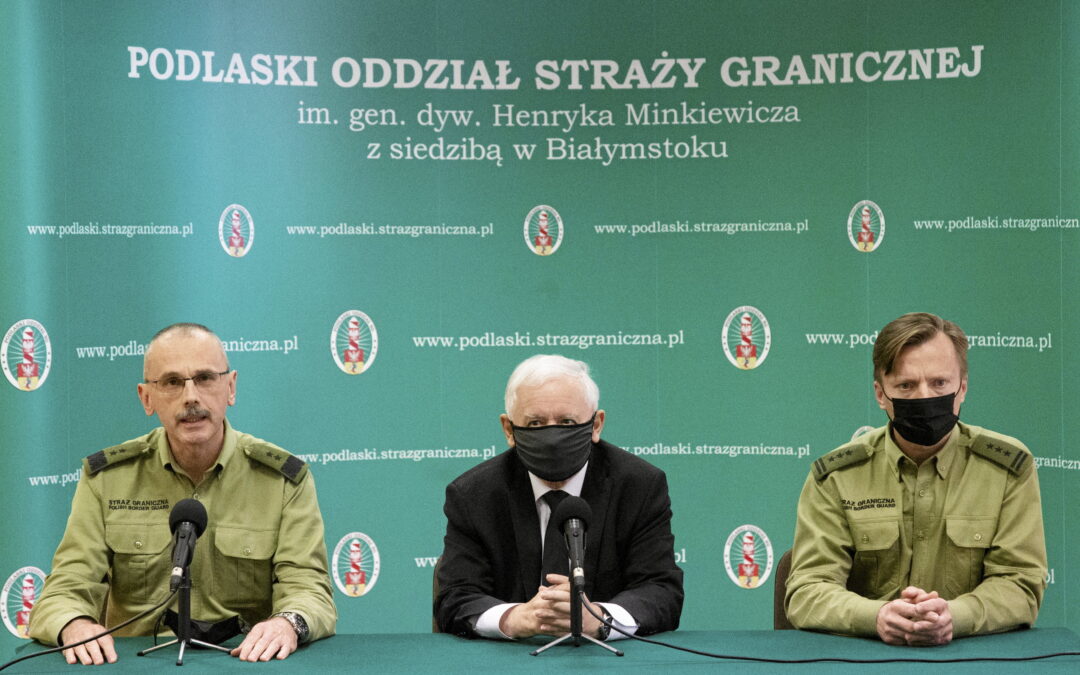Belarus, with Russian support, is sending “economic migrants” across the Polish border as part of a “hybrid war against the EU”, Jarosław Kaczyński, Poland’s most powerful man, has declared.
“This is all a cynical and brutal action…planned many months ago as revenge for [Poland] supporting the Belarusian opposition,” said Kaczyński at a conference yesterday. Though formally only a deputy prime minister, Kaczyński is Poland’s de facto leader as chairman of the ruling party.
Poland has in recent months experienced an unprecedented surge of migration at the border from Belarus, where thousands of people from the Middle East, Africa and Asia have sought to cross illegally. In response, it has declared a state of emergency and announced plans to construct an “impenetrable” border wall.
The government also faced criticism from domestic and international human rights groups, as well as the opposition, for allegedly pushing back refugees over the border in violation of international law. But Kaczyński repeated the government’s denials of this.
“There is no pressure from refugees,” said Kaczyński, who was speaking alongside the head of the border guard, Tomasz Praga. “Economic immigrants are arriving…[They] are imported.”
Poland, the Baltic states and the European Commission have condemned Belarus’s “instrumentalisation” of migrants as a tool against the EU. However, the Polish border guard also revealed last week that around 44% of border crossed detained in Poland have applied for international protection.
Kaczyński, who as deputy prime minister is responsible for national security, also reiterated his government’s claims that Belarus is orchestrating the surge in migration with Russian support, or at least approval, as part of an attack on the EU.
“[This] is a kind of hybrid war against our country, and therefore also our government, as well as the European Union,” he said, adding that he had “seen on a film that Belarusian officers personally participate in cutting barriers [and] wires” on the border.
Kaczyński also noted that Belarus has a buffer zone on the border which is inaccessible to ordinary citizens, but to which migrants are transported by Belarusian authorities and left in places where they have a chance of crossing into Poland.
The deputy prime minister also suggested that migrants are being deliberately weakened to put them in a more perilous position and thereby exert pressure in Poland. He cited video footage showing Belarusian authorities refusing to provide medical care.
“The [migrants] do not cope well with the temperature, because they are from a different geographical zone,” said Kaczyński. “Alongside using children, this is the second method meant to force us, Poland, to accept them.”
At least five border crossers have been found dead on Polish territory so far. Many of the migrants are children, with one Polish newspaper reporting that 20-30% of those detained are minors.
“This is all a cynical and brutal action…led directly by President Lukashenko,” continued Kaczyński. “Our data show that it was planned many months ago as revenge for supporting the Belarusian opposition and an attempt to put pressure on Poland, and especially on the European Union, to drop sanctions on the regime.”
The migrants are people who can afford the ticket to Belarus and therefore “not poor people”, but rather “the victims of a huge fraud and manipulation”, Kaczyński said, quoted by Polsat News.
“We can therefore sympathise with them, but we cannot not react and not defend ourselves against an operation which, if Lukashenko and Putin were successful, would lead to a crisis on not a Polish scale, but a European one – which is what these gentlemen want,” he added.
Admitting that the Polish government did not know how long the situation was likely to last, Kaczyński said that the “only effective method”, as shown by the experiences of other countries, was to build a strong wall.
There is already “some despondency among those who want to get not to Poland, but to the richer part of Europe”, he added, noting that “this is the whole truth” and that much of the media and opposition were pushing a “radical departure from the truth”.
He added that Poland’s operations had been hampered by the opposition and media. By contrast, argued Kaczyński, in Lithuania the situation is improving thanks to parliamentary support for the government’s actions, despite a more permeable border.
If “bad, tragic things happen” at the border, Kaczyński concluded, “and unfortunately they might, because winter is coming”, it will be the fault of “those supporting Lukashenko, his minions, the Russian Federation, and Putin”.
Main image credit: Agnieszka Sadowska / Agencja Gazeta

Ben Koschalka is a translator, lecturer, and senior editor at Notes from Poland. Originally from Britain, he has lived in Kraków since 2005.




















